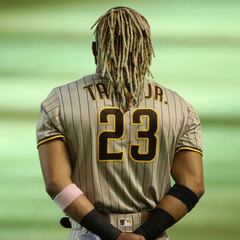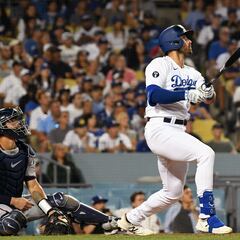How can Anthony Rizzo be hit by a pitch and not get first base?
Baseball fans are divided on a call by home plate umpire D.J. Reyburn to not award Anthony Rizzo first base after being hit by a pitch, but they are wrong


Anthony Rizzo is known for crowding the plate. His normal stance sees him plant his feet on the inside line of the batter’s box, with his toes hanging over it. When a breaking ball misses inside, it is entirely possible for it to be two or three inches off the plate and the same distance from Rizzo’s thigh.
Tampa Bay Rays southpaw Ryan Yarbrough threw Rizzo a 1-2 breaking ball that ended up about four inches inside, plunking Rizzo on the thigh. As Rizzo started to make his way to first base, home plate umpire D.J. Reyburn signalled that Rizzo would not be awarded first base. Television announcers and fans alike went wild.
Good call blue!
— 𝗭𝗮𝗰 𝗕𝗹𝗼𝗯𝗻𝗲𝗿🎙 (@ZacOnTheMic) August 16, 2022
pic.twitter.com/B1SRiEMlBr
This isn’t something that you see every day in the majors, although it is a fairly common occurrence in college baseball. Rizzo was incensed and Yankees manager Aaron Boone immediately shot out of the dugout to take up the cause, primarily to make sure that his first baseman didn’t get tossed out of the game.
Rizzo said about the pitch, “Yarbrough throws a big sweeping slider; if I bail out of the way of that and it comes back as a strike, I’m going to be pretty annoyed. I have to wait until the last second there. I don’t wear any pads up there, I’m pretty good at bracing for the balls. It’s one of those things where I braced for it. It is what it is.”
The thing about that is this, what he calls “bracing” looked for all the world like leaning into the plate so as to ensure that he was hit. If Rizzo says that was not his intention, then we have to take him at his word, but to the viewer, and most notably to Reyburn, it certainly looked like that is what was going on.
It's fair to say that this never gets called and/or this particular call was strange, but that is different from saying Rizzo didn't lean into this pitch. You can clearly see him plant his stride foot, and then follow the ball with his front leg as the pitch breaks away from him. pic.twitter.com/2bTEMxZygv
— Brian Menéndez (@briantalksbsb) August 16, 2022
Boone tried to defend his player saying that Reyburn had gotten it wrong but the evidence is clear to see from the tv replays. “Bad call. Where’s he supposed to go? He’s making a move to hit and he turns into that. It’s a missed pitch. It’s across the plate and into the box. Rizzo is all over the plate, he can’t get out of the way of that. Once he starts to make his move to hit, he rolls the hip in. I didn’t think it was the right call.”
Problem with Boone’s argument is that it was not “across the plate and into the box.” Yarbrough’s pitch was outside of the box and only just off the plate.
Anthony Rizzo has been hit by pitch 195 times, number eleven in the all-time list, and he will certainly move up to number seven or eight before this season is over. He crowds the plate so much that you could argue that he is looking to be hit by the pitch. So any movement toward the plate on his part will put him pretty much on top of the strike zone. A pitcher doesn’t have to miss by much to plunk Rizzo, and that is exactly what played out on Monday.
After his at-bat, Rizzo went back to the dugout and threw a tantrum, slamming his helmet against the bench repeatedly, and when the post-game interviews came around, he tried to lay the blame on the umpire, pulling out the “Oh-here-we-go-again-bad-umpiring” card. “We’re out here competing at the highest level and I’m OK talking to you guys, and the umpires have zero accountability when they miss something like that. I know they’re not trying to miss, but it’s just frustrating. It doesn’t matter when it happens.”
This is rare out of Rizzo pic.twitter.com/EN9m33RimJ
— Talkin' Yanks (@TalkinYanks) August 16, 2022
Unfortunately for Rizzo, he is completely wrong. That was the correct call by D.J. Reyburn. The rule that relates to this directly is 5.05(b), and it leaves little room for ambiguity.
“The batter becomes a runner and is entitled to first base without liability to be put out (provided he advances to and touches first base) when:
(1) Four “balls” have been called by the umpire;
(2) He is touched by a pitched ball which he is not attempting to hit unless (A) The ball is in the strike zone when it touches the batter, or (B) The batter makes no attempt to avoid being touched by the ball;
If the ball is in the strike zone when it touches the batter, it shall be called a strike, whether or not the batter tries to avoid the ball. If the ball is outside the strike zone when it touches the batter, it shall be called a ball if he makes no attempt to avoid being touched.
"I feel like the umpires have zero accountability when they miss something like that"
— Talkin' Yanks (@TalkinYanks) August 16, 2022
Rizzo reacts to the umpire's ruling that he leaned into the pitch that hit him pic.twitter.com/ukWNldpXPj
What is never allowed is for a player to intentionally get in the way of the ball. Rizzo’s movement toward the plate can be interpreted as this, but even if you give him the benefit of the doubt, there was no movement to try and avoid being hit by the pitch.
Everyone can accept that Rizzo disagreed with the call. But he is not a child. He has been playing in the major leagues for over ten years now. He surely is aware of his reputation as a plate crowder. He has been hit by more pitches than anyone apart from ten players in the history of the game. A turn, a flinch backward, is all that it takes. Stepping toward the plate? That is a clear example of trying to get hit by a pitch.
Absolutely. Not only did he not try to get out of the way, he stuck his leg into the pitch to get hit.
— Adam Bielamowicz (@adambevo) August 16, 2022
I got a good chuckle from the Yankees announcer saying it was behind Rizzo: the ball basically went straight over the chalk of the batters box.- pic.twitter.com/6uSXwzjf4h
Related stories
In the end, it is not a big deal. The Yankees lost the game 4-0, and the Rizzo incident would have made little difference. What makes this stink, though, is the way that Rizzo, Boone, and Yankees fans have tried to lay this one on the umpire. That is shameful and classless. D.J. Reyburn made the correct call.
It wasn’t like the pitch missed by a mile or Rizzo turned his back. With all of the same elements in place, you would have made the same call. And if you just thought “no I wouldn’t!” then you would make a terrible umpire.

